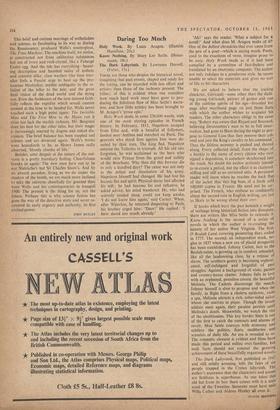Daring Too Much
The Dark Labyrinth. By Lawrence Durrell. (Faber, 15s.)
THERE are those who despise the historical novel, imagining that past events, shaped and ready for the taking, can be recorded with less effort and artistry than those of the inchoate present. The fallacy of this is evident when one considers how much hard work must have gone to pro- ducing the felicitous flow of Miss Settle's narra- tive, and how little artistry has been brought to M. Aragon's `prose epic.'
Holy Week deals, in some 270,000 words, with one of the most stirring episodes in French history. In February, 1815, Napoleon escaped from Elba and, with a handful of followers, landed near Antibes and marched on Paris. The generals who stood firm against him were de- serted by their men. The king fled. Napoleon entered the Tuileries in triumph. All his old sins forgotten, he was acclaimed as the hero who would save France from the greed and nullity of the Bourbons. Why then did this fervour die in only a hundred days? The cause was not only in the defeat and dissolution of his army. Napoleon himself had changed. He had lost his laconic fire and spirit. Physical decay had affected his will : he had become fat and talkative, he asked advice, his mind wandered. He, who had scarcely needed sleep, could not keep awake. `I do not know him again,' said Carnot. When, after Waterloo, he returned despairing to Paris, his brother urged him : `Dare!' He replied : 'I have dared too much already.' 'Ah l' says the reader. `What a subject for a novel!' And what does M. Aragon make of it? One of the dullest chronicles that ever came from the pen of a poet—which is saying much. Poets, used to the exactions of verse, imagine prose to be easy. Holy Week reads as if it had been compiled by a committee of fact-finders and translated by an electronic computer. The author not only indulges in a ponderous style, he seems unable to select his materials and gives no sort of life to his characters.
We are asked to believe that the leading character, Gericault—none other than the dash- ing young Gericault, painter of genius and one of the sublime spirits of his age—brooded for page after moribund page on just those facts with which the author wishes to itcquaint his readers. The other characters oblige in the same way. `Robert was aware that Riquet and Bouvard, believing Desnouettes's men to be in full insur- rection, had gone to Ham during the night to pro- pose to General Lion that they remove their col- onel and join the King's cavalry to his command.' Thus the lifeless monster is pushed and shoved along. Every collected detail, from the shape of a buckle to the name of every citizen who ever signed a deposition, is somehow shoehorned into the mash. No doubt the author seriously intends to re-create a period, but the effect is as cluttered, stifling and still as an unvisited attic. A persistent reader will learn when he reaches the back flap of the jacket that this big bore of a book sold 100,000 copies in France. He need not be sur- prised. The French, who enthuse so confidently about the second-rate in English writing, are just as likely to be wrong about their own If books which bury the past beneath a weight of verbiage bring historical fiction into disrepute, there are writers like Miss Settle to reinstate it. Know Nothing is the second of a series of novels in which the author is re-creating the history of her native West Virginia. The first, 0 Beulah Land, covering pioneering days, ended in 1775. The second, an independent work, be- gins in 1837 when a new era of placid prosperitY has been established. Johnny Catlett, heir to the Beulah estate, is growing up in comfort, attended, like all the landowning class, by a retinue of slaves. The southern gentry is becoming sophisti- cated, self-indulgent and forgetful of past struggles. Against a background of visits, parties and country-house chatter. Johnny falls in love with an orphaned, penniless cousin, the beautiful Melinda. The Catletts discourage the match. Johnny himself is slow to propose and when the family, in flight from a cholera epidemic, visits a spa, Melinda attracts a rich, sober-sided suitor whom she marries in pique. Though the lovers seldom meet again, their passion persists until Melinda's death. Meanwhile, we watch the rise of the abolitionists. This key border State is one of the first to catch the rumours and alarms of revolt. Miss Settle conveys with economy and subtlety the politics, fears, snobberies and scandals of daily life. An era is revealed to us. The romantic element is evident and films have made this period and milieu over-familiar, but such facts should not conceal the growing achievement of these beautifully organised novels.
The Dark Labyrinth, first published in 1947 and still mildly amusing, tells the fates of six people trapped in the Cretan labyrinth. The author's assurance that the characters and events are fictitious is superfluous. As one takes this old hat from its box there comes with it a stale scent of the Twenties. Someone must have spilt Willa Cather and Aldous Huxley all over it.
OLIVIA MANNINO






































 Previous page
Previous page